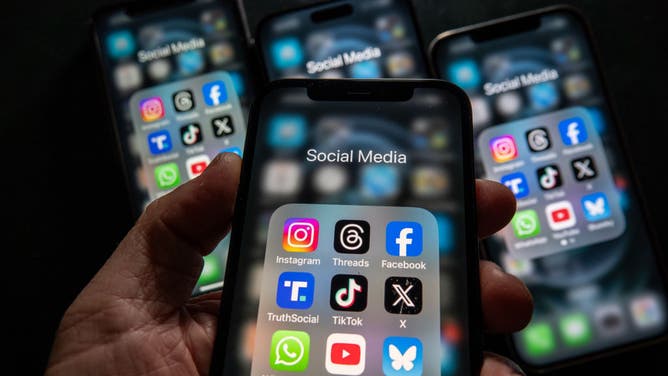CBS News Extols The Virtues Of German Speech Police After Vance Speaks Out | Mary Katharine Ham
When J.D. Vance gave a speech about free speech in front of Europe this week, the speech police were very offended that he did not properly appreciate the contributions of the speech police to a free society.
After all, what would democracy and discourse be without EU officials’ plans to shut down social media in times of unrest at the first hint of "hateful content," Germany doing police raids over alleged anti-feminist sentiment online, and the UK arresting pro-life activists for praying silently in their minds? These are all real cases the vice president referenced. Vance concluded that the values we thought we shared with the rest of the Western world don’t feel as shared as we’d hoped.

MUNICH, GERMANY - US vice president JD Vance (L) participates in a bilateral meeting with German president Frank-Walter Steinmeier at the 61st Munich Security Conference on February 14, 2025 in Munich, Germany.(Photo by Johannes Simon/Getty Images)
"In Britain and across Europe, free speech I fear, is in retreat," he said.
German Chancellor Olaf Scholz retorted by confirming Germans do not have freedom of speech: "We should be very clear that free speech in Europe means that you are not attacking others in ways that are against legislation and laws we have in our country."
Another German official cried after Vance’s speech, which seemed an odd way to assert European strength in the face of this critique.
But Europeans have a long history of not understanding the value of free speech. The fact that most of the Vance litany doesn’t happen routinely in the U.S. is because we have a First Amendment and they do not. It is disappointing, but expected.
But the most robust defense of speech policing, in the aftermath of Vance’s speech, came from CBS News. The Sunday night news magazine "60 Minutes" ran a 13-minute segment fawning over the literal German speech police. You don’t think Vance was properly deferential to the powerful people knocking down doors for Facebook comments? Boy, have we got a news outlet for you!
The segment, clearly in production for some time and hosted by reporter Sharyn Alfonsi, starts with this framing, on the backdrop of a giant "Policing the Internet" graphic:
"In the United States, most of what anyone says, sends or streams online, even if it’s hate-filled or toxic, is protected as free speech under the First Amendment. But Germany is trying to bring some civility to the World Wide Web by policing it in a way most Americans could never imagine.... As we saw, it often begins with a pre-dawn wake-up call from the police."
Alfonsi’s crew goes with six armed police officers as they raid a private citizen’s apartment and confiscate his computer and phone under suspicion of having been involved in the crime of posting bad memes. She notes that this is just one of 50 such raids happening simultaneously to "curb online hate speech in Germany."
She sits down for a friendly chat with a trio of prosecutors investigating cases against tweeters. These Germans, the voiceover intones, say they are "protecting democracy & discourse by introducing a touch of German order to the unruly World Wide Web." If that sentence doesn’t scare you, how about these?
She asks which things are illegal in Germany.
"Is it a crime to insult somebody in public?" Yes, they reply. And the punishment could be much larger for insulting someone online, since that speech sticks around, they explain as Alfonsi nods along.
What about re-posting someone else’s online content? Would that be illegal if the original content was found to be in violation of the law? Yes.
The prosecutors explain that sometimes even Germans are surprised that saying things is illegal in their country. Alfonsi smiles and nods.

(Photo by Anna Barclay/Getty Images)
"How do people react when you take their phones from them?" The three prosecutors laugh as they concede it is a surprise and quite a hardship for people to have their smartphones confiscated for tweeting badly. Alfonsi chuckles with them adding, "your whole life is typically on your phone now."
Alfonsi goes to an office where one of the trio— a bespectacled, balding man of bureaucratic mien—shows her the racks of files on private citizens’ speech. The Germans boast 16 prosecutorial offices working on 3000+ cases per year. She admires his work, her disposition as if she were visiting a pet shelter for the local news, hearing about all the adorable dogs they’ve placed in forever homes. Except the presentation she’s beaming over is ""zees is how vee catch zee people who say zee bad thoughts."
Her happy acceptance of prosecuting people for icky speech is so thorough that you can almost imagine it’s a "Daily Show" bit, in which the reporter is pretending to approve of the Germans’ matter-of-fact authoritarianism while winking at the camera. But no wink ever comes.
Alfonsi poses only lightly critical questions. She interviews zero free-speech advocates, either in Germany or here. She interviews no one who has been overzealously prosecuted for their speech.
"The criticism that this feels like the surveillance that Germany conducted 80 years ago, how do you respond to that," she asks. "In the United States, a lot of people look at this and say this is restricting free speech. It’s a threat to democracy."

Getty Images
Josephine Ballon, an employee of pro-censorship non-profit HateAid, assures viewers there is no surveillance— there is— while warning of the dangers of "endless freedom to say anything they want," which could scare people away from online discussions.
"Already half of zee Internet users in Chermany are afraid to express zeir political opinion," Ballon says. "Und rarely participate in debates online anymore."
Gee, I wonder why, Helga. Is it the anonymous commenters calling them pricks or the former East German shot-putter standing over them with handcuffs that makes them scared?
Alfonsi ends with this, which I hoped briefly might indicate some understanding of the value of free speech, but nope.
"You're doing all this work, you're doing investigations, finding people, sometimes putting them in jail. Does it make a difference if it's a World Wide Web and there's a lot of hate out there?"
The question is whether the government can ever really prosecute enough speech, from an American reporter. The best thing that could be said for this piece is it made Margaret Brennan’s moral and historical idiocy seem positively minor by comparison.
But both probably sound better in the original German.